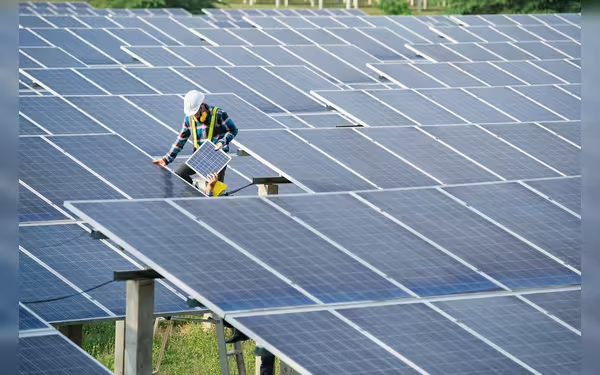Sunday, July 7, 2024 11:26 AM
International Energy Agency Urges Swift Adoption of Sustainable Technologies
- Clean energy solutions must be accessible to all, especially those facing financial challenges.
- Investments in clean energy sector crucial for achieving net-zero emissions by 2050.
- Transition to clean energy faces challenges in developing countries due to lack of funding.
 Image Credits: arabnewspk
Image Credits: arabnewspkThe International Energy Agency emphasizes the importance of swift adoption of sustainable technologies to make energy more affordable and achieve net-zero emissions by 2050. Despite challenges in developing countries, prioritizing investments in clean energy and addressing financial barriers are crucial steps towards a greener and more sustainable energy future.
In a recent study, it has been highlighted that the swift adoption of sustainable technologies holds the key to making energy more affordable for everyone. The International Energy Agency stresses the significance of ensuring that clean energy solutions are accessible to individuals who may face financial challenges. To meet the ambitious goal of achieving net-zero emissions by 2050, it is imperative to ramp up investments in the clean energy sector.
One of the key advantages of clean energy technologies is their long-term cost-effectiveness when compared to traditional fossil fuels such as coal, natural gas, and oil. Solar photovoltaic and wind energy have emerged as the most economically viable options for power generation, offering substantial cost savings over conventional sources.
The report also points out the decreasing costs of solar PV modules, making them a feasible choice for a wide range of projects, including large-scale installations and residential solar systems, especially when combined with affordable battery storage solutions.
Despite the initial higher costs, electric vehicles are projected to be more economical in the long run due to lower maintenance expenses. Similarly, energy-efficient appliances like air conditioners deliver cost benefits over their lifespan.
However, the transition to clean energy faces challenges, particularly in developing countries where clean energy funding is lacking due to perceived risks and limited access to financing. Addressing fossil fuel subsidies that impede the progress of clean energy initiatives is crucial, as emphasized in the report.
It is essential to accelerate the adoption of clean technologies to ensure a more stable and affordable energy future. Governments are called upon to enact policies that promote the adoption of renewables, especially among marginalized communities, to create a more inclusive and sustainable energy landscape.
While the benefits of clean energy transitions are numerous, governments must remain vigilant against potential price fluctuations and security risks. Geopolitical tensions and the necessity for resilient power systems underscore the importance of continuous investments in energy infrastructure and digital security.
Furthermore, securing a stable supply of energy transition minerals is identified as a critical factor in achieving net-zero goals. The market for these essential minerals is expected to grow significantly in the upcoming years, highlighting the need to establish a diversified and reliable mineral supply chain.
The shift towards sustainable technologies in the energy sector not only promises a cleaner environment but also holds the key to a more affordable and resilient energy future. By prioritizing investments in clean energy, addressing financial barriers, and promoting renewable solutions, we can pave the way for a greener and more sustainable world for generations to come.













